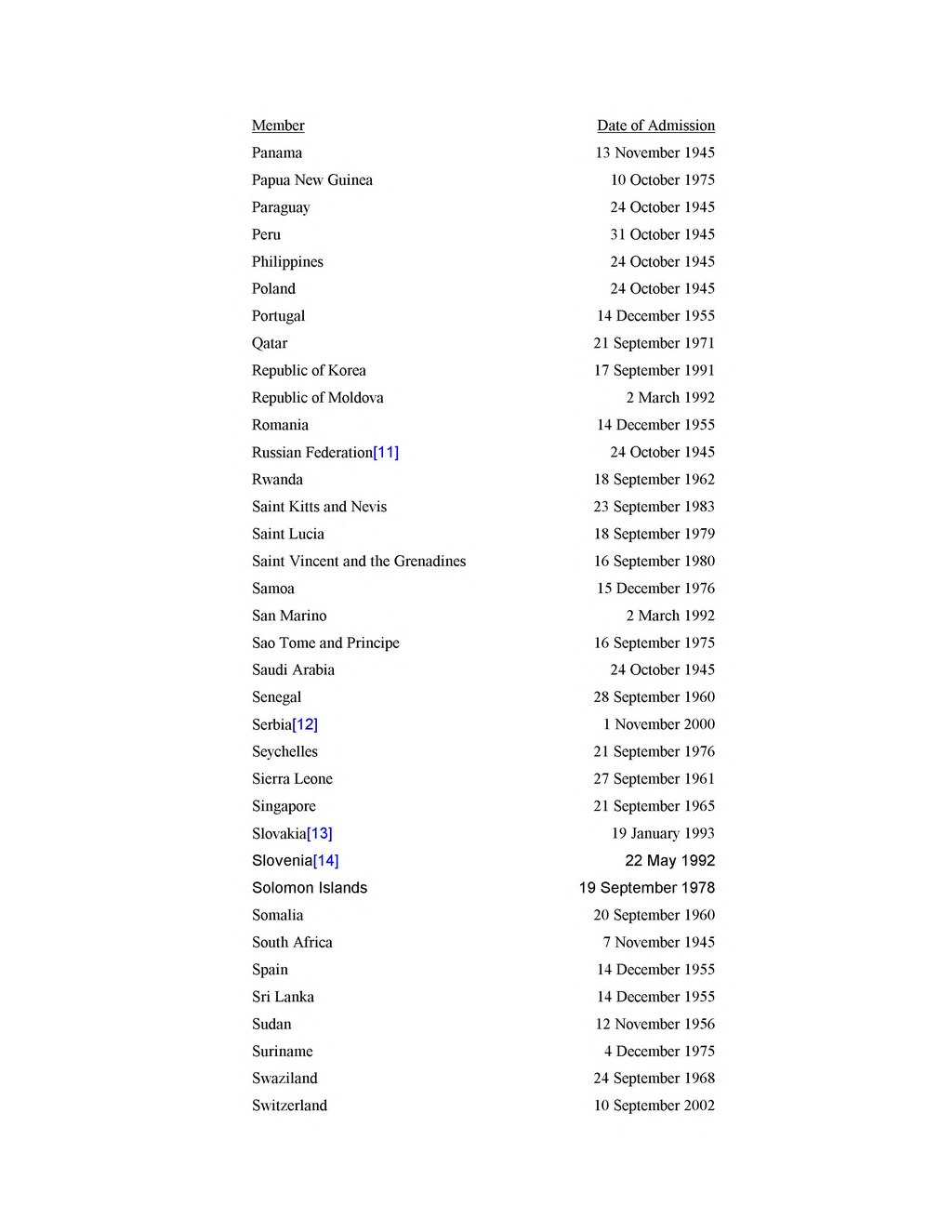This page has been validated.
| Member | Date of Admission |
|---|---|
| Panama | 13 November 1945 |
| Papua New Guinea | 10 October 1975 |
| Paraguay | 24 October 1945 |
| Peru | 31 October 1945 |
| Philippines | 24 October 1945 |
| Poland | 24 October 1945 |
| Portugal | 14 December 1955 |
| Qatar | 21 September 1971 |
| Republic of Korea | 17 September 1991 |
| Republic of Moldova | 2 March 1992 |
| Romania | 14 December 1955 |
| Russian Federation[1] | 24 October 1945 |
| Rwanda | 18 September 1962 |
| Saint Kitts and Nevis | 23 September 1983 |
| Saint Lucia | 18 September 1979 |
| Saint Vincent and the Grenadines | 16 September 1980 |
| Samoa | 15 December 1976 |
| San Marino | 2 March 1992 |
| Sao Tome and Principe | 16 September 1975 |
| Saudi Arabia | 24 October 1945 |
| Senegal | 28 September 1960 |
| Serbia[2] | 1 November 2000 |
| Seychelles | 21 September 1976 |
| Sierra Leone | 27 September 1961 |
| Singapore | 21 September 1965 |
| Slovakia[3] | 19 January 1993 |
| Slovenia[4] | 22 May 1992 |
| Solomon Islands | 19 September 1978 |
| Somalia | 20 September 1960 |
| South Africa | 7 November 1945 |
| Spain | 14 December 1955 |
| Sri Lanka | 14 December 1955 |
| Sudan | 12 November 1956 |
| Suriname | 4 December 1975 |
| Swaziland | 24 September 1968 |
| Switzerland | 10 September 2002 |
- ↑ The Union of Soviet Socialist Republics was an original Member of the United Nations from 24 October 1945. In a letter dated 24 December 1991, Boris Yeltsin, the President of the Russian Federation, informed the Secretary-General that the membership of the Soviet Union in the Security Council and all other United Nations organs was being continued by the Russian Federation with the support of the 11 member countries of the Commonwealth of Independent States.
- ↑ In a letter dated 3 June 2006, the President of the Republic of Serbia informed the Secretary-General that the membership of Serbia and Montenegro was being continued by the Republic of Serbia, following Montenegro's declaration of independence. On 4 February 2003, following the adoption and promulgation of the Constitutional Charter of Serbia and Montenegro by the Assembly of the Federal Republic of Yugoslavia, the official name of "Federal Republic of Yugoslavia" was changed to Serbia and Montenegro. The Socialist "Federal Republic of Yugoslavia was an original Member of the United Nations, the Charter having been signed on its behalf on 26 June 1945 and ratified 19 October 1945, until its dissolution following the establishment and subsequent admission as new Members of Bosnia and Herzegovina, the Republic of Croatia, the Republic of Slovenia, The former Yugoslav Republic of Macedonia, and the Federal Republic of Yugoslavia. The Federal Republic of Yugoslavia was admitted as a Member of the United Nations by General Assembly resolution A/RES/55/12 of 1 November 2000.
- ↑ Czechoslovakia was an original Member of the United Nations from 24 October 1945. In a letter dated 10 December 1992, its Permanent Representative informed the Secretary-General that the Czech and Slovak Federal Republic would cease to exist on 31 December 1992 and that the Czech Republic and the Slovak Republic, as successor States, would apply for membership in the United Nations. Following the receipt of its application, the Security Council, on 8 January 1993, recommended to the General Assembly that the Slovak Republic be admitted to United Nations Membership. The Slovak Republic was thus admitted on 19 January of that year as a Member State.
- ↑ The Socialist Federal Republic of Yugoslavia was an original Member of the United Nations, the Charter having been signed on its behalf on 26 June 1945 and ratified 19 October 1945, until its dissolution following the establishment and subsequent admission as new Members of Bosnia and Herzegovina, the Republic of Croatia, the Republic of Slovenia, The former Yugoslav Republic of Macedonia, and the Federal Republic of Yugoslavia. The Republic of Slovenia was admitted as a Member of the United Nations by General Assembly resolution A/RES/46/236 of 22 May 1992.
